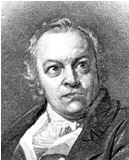Songs of Innocence and Experience by William Blake
Page 18 of 18 - 1 2 3 4 5 6 7 8 9 10 11 12 13 14 15 16 17 18 Purchase full notes for £5.95 (aprox $9.28)
The crux of this poem is the fifth stanza, and it is difficult for the reader to interpret these lines precisely. It is clear enough, however, that the ‘stars’ dislike the tiger and attack both the beast and, presumably, his creator. They also weep. Such a reaction suggests, perhaps, an angelic revulsion at demonic energy (cf. the angels in Night who likewise ‘Pitying stand and weep’ when faced with ‘wolves and tygers’), and the first two poems of the Songs of Experience suggest a negative view of the stars – ‘Starry Jealousy’ being associated with the cruel ‘God’ of experience . What happens, it may be considered, to those who, like Blake, create tigers of the mind when they find themselves psychologically oppressed by a false Christianity of judgement and cruelty? The answer is surely that they rebel: their revolutionary anger becomes ‘The tigers of wrath,’ who in The Marriage of Heaven and Hell are ‘wiser than the horses of instruction.’ Blake’s ‘Tyger’ is not so much a real beast as a creature of his own imagination – and, in a sense, he, the poet, makes the ‘Tyger,’ just as before he had made ‘The Lamb.’ When later Blake created his own mythology as a way of expressing his ever-more complex ideas, the judgemental false ‘God’ of reason became the chained, white-haired Ancient called ‘Urizen;’ the prophetic struggler and ‘God’ of the imagination and artistic creation became the blacksmith ‘Los.’.
previous
Purchase full notes for £5.95 (aprox $9.28)

